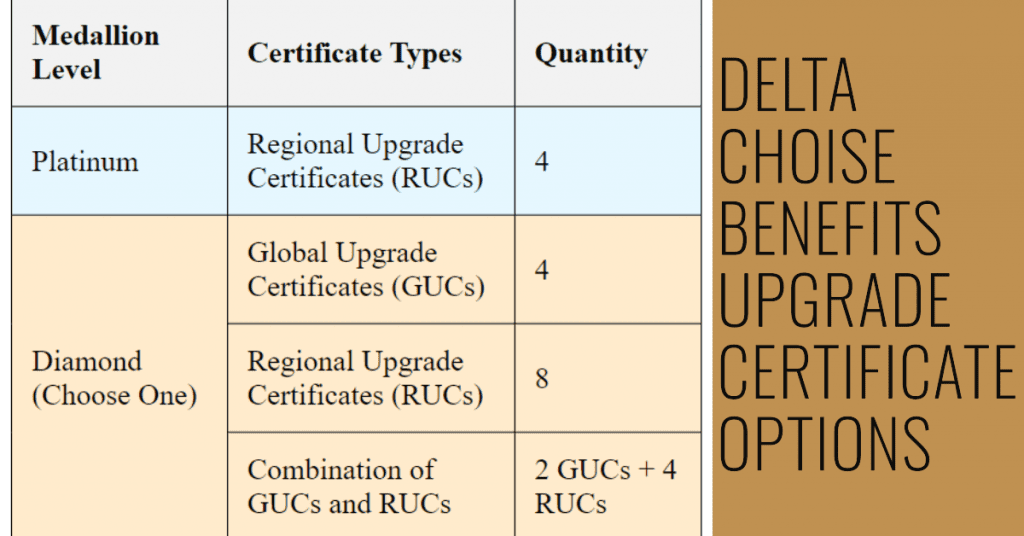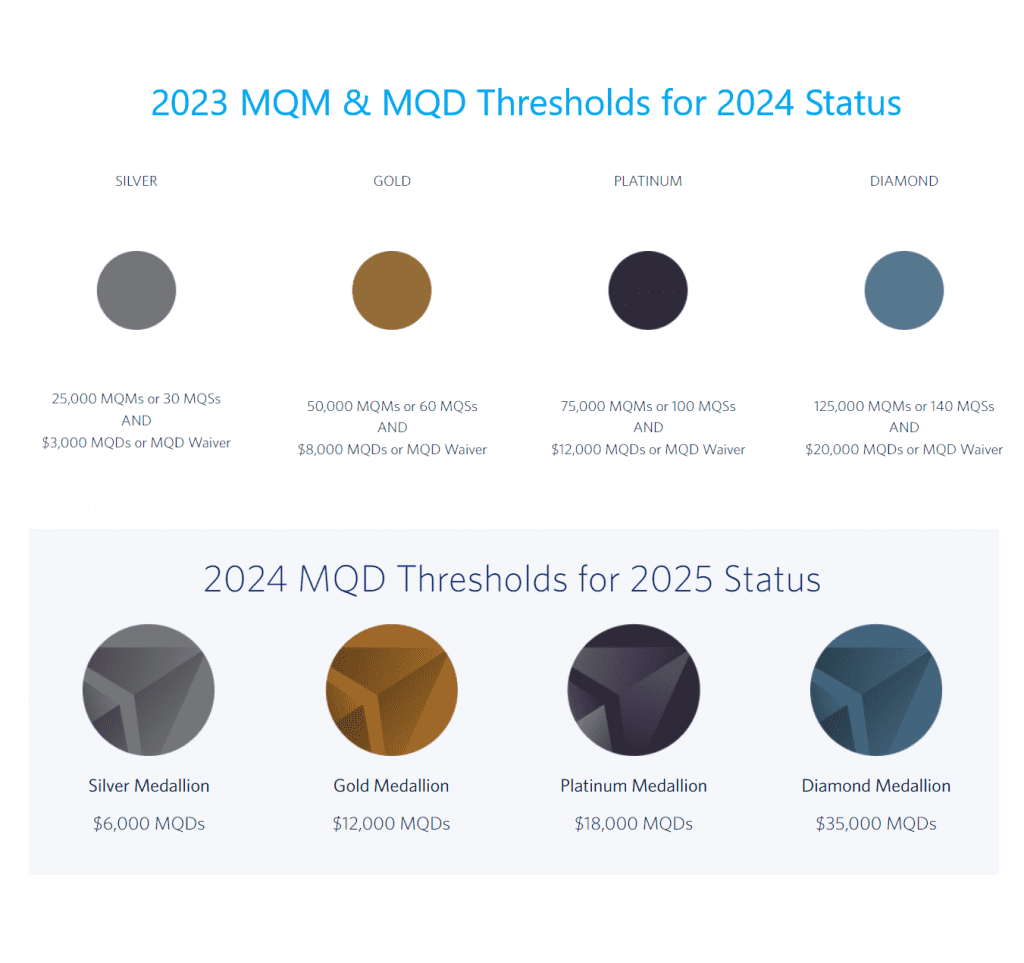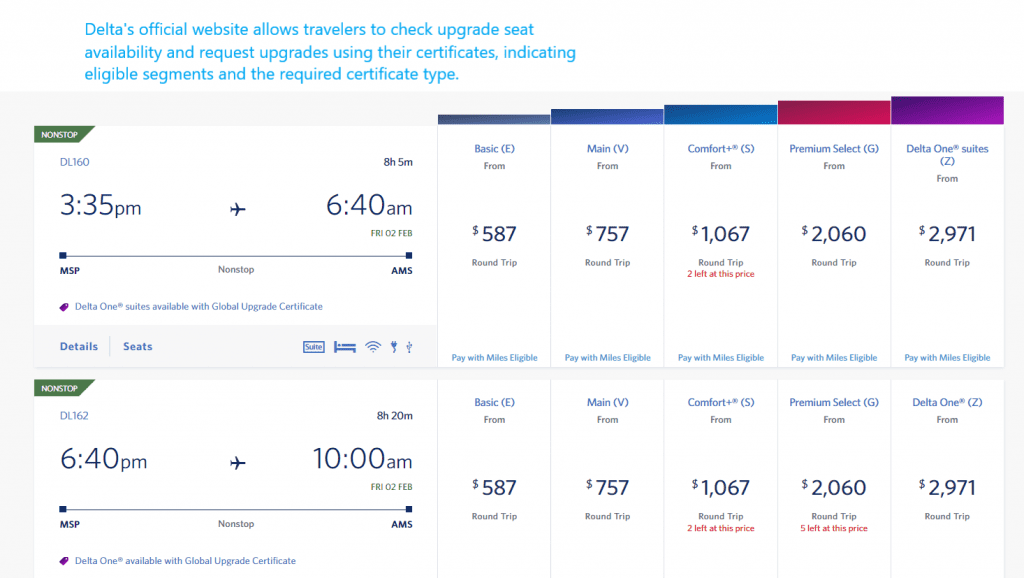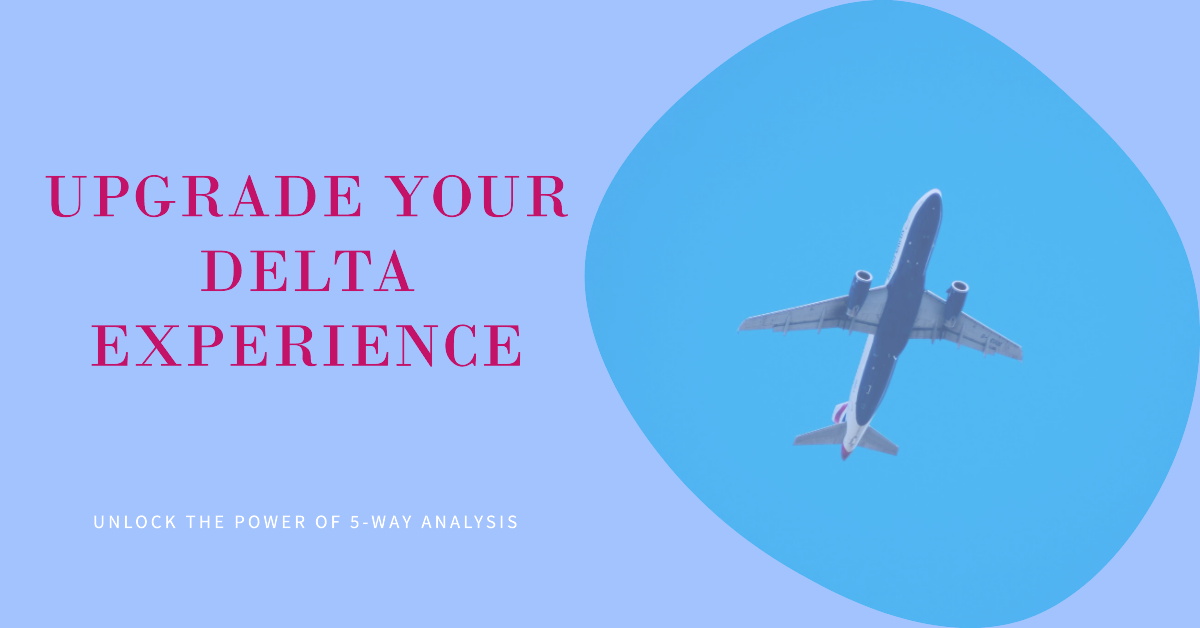Table of Contents
| Key Takeaways |
|---|
| Delta frequent flyers express dissatisfaction with recent Medallion qualification changes. |
| Delta CEO acknowledges changes were too abrupt and commits to modifications in response to customer outcry. |
| Delta’s upgrade certificate system provides a strategic approach to enhance customer loyalty and optimize seat capacity. |
| Advantages of Delta’s upgrade certificates include predictability, clear allocation structure, enhanced customer loyalty, and strategic capacity management. |
| Disadvantages of Delta’s upgrade certificates encompass limited earning channels, availability constraints, potential upgrade denials, and tier-based limitations. |
| Delta’s upgrade certificate system is compared to American Airlines and United Airlines, highlighting its predictability and clarity compared to competitors. |
Introduction
In the dynamic realm of air travel, securing a superior flight experience often hinges on obtaining coveted upgrades. Delta Air Lines, a prominent player in the aviation industry, employs a distinctive upgrade certificate system that grants passengers the opportunity to elevate their travel class. The acquisition of these upgrade certificates is intricately tied to a passenger’s loyalty status within Delta’s frequent flyer program, specifically Platinum or Diamond status.
This section aims to provide an in-depth understanding of the mechanics behind Delta’s upgrade certificate system, shedding light on the criteria for earning these valuable assets. We will explore the thresholds set by Delta in terms of Medallion Qualifying Miles (MQM) and Medallion Qualifying Dollars (MQD) for Platinum and Diamond status, differentiating between the requirements for the year 2024 and the subsequent years. Through this comprehensive exploration, we aim to elucidate how this system contributes to Delta’s competitive edge and underscores its dedication to passenger-centric services.
Earning Delta’s Upgrade Certificates
The acquisition of Delta’s upgrade certificates is contingent upon meeting specific criteria set by the airline. For the year 2024, passengers aiming for Platinum or Diamond status need to meet both the MQM and MQD thresholds. The MQM threshold represents the minimum number of miles flown on Delta or its partner airlines, while the MQD threshold represents the minimum amount spent on Delta flights.
However, for the year 2025 and onwards, the criteria shift, requiring passengers to meet only the MQD requirement for Platinum or Diamond status. This modification offers an evolving pathway for passengers to attain and utilize these upgrade certificates.
In the wake of Delta Air Lines’ recent Medallion qualification changes, there has been a notable uproar among Delta frequent flyers and loyalists. The alterations to the Medallion qualification criteria were met with frustration and disappointment from a significant portion of the airline’s dedicated customer base. The adjustments were seen as drastic and rapid, causing concern about the potential impact on loyal customers’ benefits and status.
However, amidst the discontent, Delta’s CEO has openly acknowledged that the changes were too abrupt and comprehensive. In response to the outcry, the company has committed to reevaluating and revising the modifications in the weeks to come. This acknowledgment of oversight and the promise of forthcoming modifications reflect Delta’s dedication to maintaining a strong and symbiotic relationship with its loyal passengers.
Delta’s Upgrade Certificates: An Overview
Delta Air Lines has strategically integrated an upgrade certificate system to enhance the travel experience for passengers seeking an elevated class of service. This system epitomizes Delta’s commitment to providing exceptional service and rewarding customer loyalty.
How Delta’s Upgrade Certificates Work
Delta’s upgrade certificates act as a form of currency, granting passengers the opportunity to move to a higher class of service. These certificates are earned based on the passenger’s loyalty and qualifying activities, primarily tied to Medallion Qualifying Miles (MQM) and Medallion Qualifying Dollars (MQD). For the year 2024, both MQM and MQD thresholds are required to achieve Platinum or Diamond status and earn upgrade certificates. However, starting in 2025, only meeting the MQD requirement suffices.
Once earned, these certificates can be redeemed to upgrade from the originally booked class to a higher class, providing access to premium amenities and a more comfortable journey.
Accessibility and Availability

The accessibility and availability of upgrade certificates are directly linked to a passenger’s loyalty status within Delta’s frequent flyer program. Earning Platinum or Diamond status within this program is a significant milestone that unlocks the opportunity to earn and utilize these certificates. This achievement provides passengers with a clearly defined pathway towards enjoying an enhanced travel experience.
Upon reaching Platinum or Diamond status, passengers gain access to a variety of benefits, including the ability to earn upgrade certificates. These certificates act as valuable assets, allowing travelers to elevate their flight experience by securing upgrades to higher cabin classes.
However, it’s important to note that the availability of these upgrades is contingent upon seat availability in the desired class. This means that while having upgrade certificates is an advantage, their actual utilization is subject to the number of open seats in the upgraded class on a specific flight.
To facilitate a seamless upgrade process, Delta allows passengers to request upgrades and keep a close eye on their upgrade status as their flight date approaches. This transparency and control empower passengers to actively manage their travel preferences, making informed decisions and enhancing their overall journey.
Enhancing the Travel Experience
Delta’s upgrade certificate system significantly elevates the travel experience. Passengers can enjoy benefits such as increased legroom, priority boarding, and superior meal options, contributing to a more enjoyable journey. This approach resonates with Delta’s commitment to delivering exceptional customer service and ensuring a memorable travel experience.
Comparison with Competitors
In the competitive landscape of the airline industry, the efficiency and appeal of an upgrade system significantly influence a passenger’s choice of airline. Delta Air Lines’ upgrade certificate system is a vital component of its strategy to enhance customer experience and build loyalty. In this section, we’ll compare Delta’s approach with that of two major competitors: American Airlines and United Airlines.
American Airlines: A Comparative Analysis
American Airlines implements a system where passengers can request upgrades using a virtual currency called “eVouchers” or by earning elite status and utilizing complimentary upgrades. The availability and process for upgrades may vary based on the fare class and the passenger’s elite status.
Advantages of American Airlines’ System:
- Diverse Methods: American Airlines offers multiple pathways to upgrades, including using eVouchers or earning elite status, providing passengers with flexibility in accessing upgrades.
- Complimentary Upgrades: Higher-tier elite members can enjoy complimentary upgrades, incentivizing loyalty and encouraging passengers to progress within the airline’s loyalty program.
Disadvantages of American Airlines’ System:
- Limited Availability: Complimentary upgrades may have limited availability, especially for lower-tier elite members, making it challenging to secure upgrades on popular routes or during peak travel times.
United Airlines: A Comparative Analysis
United Airlines employs a system where passengers can request upgrades using “PlusPoints” or through elite status. The upgrade availability is determined by fare class, elite status, and the number of PlusPoints available.
Advantages of United Airlines’ System:
- Structured Points System: The PlusPoints system provides a clear structure for earning and using upgrade points, simplifying the process for passengers and enabling strategic planning for upgrades.
- Upgrade Flexibility: Passengers can use PlusPoints to upgrade to a higher class or even for extra legroom seats, offering flexibility in enhancing their travel experience.
Disadvantages of United Airlines’ System:
- Variable Upgrade Costs: The number of PlusPoints required for an upgrade can vary based on factors like flight distance and class, making it challenging for passengers to predict the exact cost of an upgrade.
Delta Airlines: A Comparative Analysis
Delta’s upgrade certificate system allows passengers to upgrade by redeeming certificates earned through loyalty programs or promotions. The upgrade process is contingent upon the availability of seats in the desired class and the passenger’s elite status.
Advantages of Delta’s System:
- Predictable Upgrade Path: Delta’s system offers predictability, as passengers know the number of certificates they have and can plan their upgrades accordingly, providing a clear pathway to a better class of service.
- Structured Allocation: The tier-based allocation of upgrade certificates provides predictability for passengers, enabling them to anticipate and plan their upgrades based on their loyalty status.
Disadvantages of Delta’s System:
- Limited Earning Channels: The availability of upgrade certificates may be limited to specific loyalty programs or promotions, potentially restricting access for a broader range of passengers.
Comparison with Competitors
| Airline | Upgrade System | Advantages | Disadvantages |
|---|---|---|---|
| American Airlines |
|
|
|
| United Airlines |
|
|
|
| Delta Airlines |
|
|
|
Advantages of Delta’s Upgrade Certificates
Delta Air Lines’ upgrade certificate system offers several distinctive advantages that significantly contribute to an enhanced travel experience for passengers. These advantages set Delta apart in the competitive airline landscape and showcase the benefits of utilizing upgrade certificates within the Delta ecosystem.
Predictability and Certainty
One of the significant advantages of Delta’s upgrade certificate system is the predictability and certainty it provides to passengers. Passengers are aware of the number of upgrade certificates they possess based on their loyalty status, allowing for strategic planning of upgrades. This predictability enables passengers to anticipate and plan for an improved class of service, enhancing their overall travel experience.
Clear Allocation Structure
Delta’s tier-based allocation structure for upgrade certificates offers a transparent and equitable distribution mechanism. Passengers know the criteria for earning certificates, making it easier for them to understand how to qualify for upgrades. This clarity encourages passenger engagement with Delta’s loyalty programs, fostering a sense of progression and incentive for continued loyalty.
Enhanced Customer Loyalty
The availability and utilization of upgrade certificates positively influence customer loyalty. Passengers perceive upgrade certificates as valuable rewards for their loyalty and engagement with Delta Air Lines. This perception reinforces their commitment to the airline, leading to increased customer retention and a higher likelihood of choosing Delta for future travel needs.
Strategic Capacity Management
Delta’s upgrade certificate system enables strategic capacity management for the airline. By allowing passengers to upgrade using certificates, Delta optimizes the allocation of seats across various classes. This strategic approach ensures efficient seat utilization, enhances customer satisfaction, and aligns with Delta’s goal of delivering a premium travel experience.
Incentive for Loyalty Program Participation
Delta’s upgrade certificates serve as a powerful incentive for passengers to actively participate in the airline’s loyalty programs. Passengers are motivated to achieve and maintain elite status to access a higher number of certificates, further fueling their engagement and involvement with Delta’s loyalty ecosystem.
Disadvantages of Delta’s Upgrade Certificates
While Delta Air Lines’ upgrade certificate system offers various advantages, it is essential to acknowledge potential limitations and disadvantages that passengers may encounter when utilizing this system. Understanding these drawbacks provides a balanced perspective and enables passengers to make informed decisions regarding their upgrade preferences.
Limited Earning Channels
Delta’s methods for earning upgrade certificates might be more restrictive in comparison to rival airlines. While Delta provides certificates primarily through loyalty programs by meeting the MQM and MQD thresholds, the options for earning them may not be as extensive as those offered by other airlines. This limitation hinders access for a wider spectrum of passengers who may not qualify for these particular earning channels.
Availability Constraints
The availability of upgrade certificates is subject to constraints based on the passenger’s elite status and the fare class of their original booking. Passengers with lower elite status may find it challenging to secure upgrade certificates, especially during peak travel times or on popular routes. This limited availability can hinder the seamless utilization of upgrade certificates for an enhanced travel experience.
Tier-Based Constraints
Delta’s upgrade certificate program operates on a tiered structure. The top-tier, Diamond elite membership, provides a substantial allocation of certificates, allowing for upgrades to the Delta One cabin—an exclusive privilege. However, this structure may pose challenges for travelers in the lower Platinum tier, who fly less frequently. Platinum tier passengers may have access to Regional upgrade certificates, potentially impacting their ability to experience an upgraded class of service for international travel.
The Ultimate Guide to Delta Global Upgrade Certificates for Luxurious Travel

Competitive Landscape Variability
The effectiveness of Delta’s upgrade certificate system is also influenced by the competitive landscape. The advantages and disadvantages may vary based on the offerings of competing airlines. If competitors offer more accessible or attractive upgrade systems, Delta’s system may be perceived as less favorable in comparison.
FAQs (Frequently Asked Questions)
How can I earn Delta upgrade certificates?
Delta upgrade certificates can be earned through participation in Delta’s loyalty programs, such as the Delta SkyMiles program. These certificates are often granted when passengers achieve specific elite statuses, such as Platinum or Diamond Medallion status. Additionally, Delta sometimes offers promotional opportunities to earn upgrade certificates. For the year 2024, both Medallion Qualifying Miles (MQM) and Medallion Qualifying Dollars (MQD) thresholds are essential for achieving Platinum or Diamond status and earning upgrade certificates.
Can you explain the MQD and MQM requirements for Delta’s upgrade certificates?
Certainly! Medallion Qualifying Dollars (MQD) represent the minimum amount you need to spend on Delta flights to qualify for elite statuses like Platinum or Diamond. Medallion Qualifying Miles (MQM) represent the minimum number of miles you need to fly on Delta or its partner airlines to qualify for these elite statuses. In 2024, both MQD and MQM requirements are necessary for achieving Platinum or Diamond status and earning upgrade certificates. Starting in 2025 and onwards, only meeting the MQD requirement suffices for these achievements.
Are Delta upgrade certificates transferable to other individuals?
No, Delta upgrade certificates are typically non-transferable and can only be used by the individual for whom they were issued. They are intended to enhance the travel experience of the account holder and are subject to the terms and conditions outlined by Delta Air Lines.
Can I use Delta upgrade certificates for any flight?
Delta upgrade certificates are subject to availability and specific terms and conditions. They can typically be used for flights operated by Delta Air Lines and its eligible partner airlines. Availability is based on various factors, including seat availability in the desired class and the fare class of the original booking.

How do I check the availability of upgrade seats for my flight?
Passengers can check the availability of upgrade seats through Delta’s official website or mobile app. During the booking or check-in process, there is usually an option to request an upgrade, and the system will display the availability of upgrade seats for the desired flight.
Can I request an upgrade using Delta upgrade certificates for a group booking?
The use of upgrade certificates for group bookings may be subject to restrictions and limitations. It’s advisable to contact Delta’s customer service or the specific department handling group reservations to inquire about the possibility of utilizing upgrade certificates for group travel and any associated terms.
Conclusion
Delta Air Lines’ upgrade certificate system represents a strategic approach to enhance customer satisfaction, optimize flight capacity, and foster customer loyalty. Through the allocation of upgrade certificates, Delta empowers passengers to elevate their travel class, offering a more luxurious and comfortable journey.
This analysis delved into the mechanics, advantages, and potential drawbacks of Delta’s upgrade certificate system. The system’s predictability, clear allocation structure, and role in enhancing customer loyalty emerged as prominent advantages. The strategic capacity management facilitated by this system aligns with Delta’s commitment to delivering a premium travel experience.
However, limitations such as limited earning channels, availability constraints, and potential upgrade denials were also acknowledged. These drawbacks emphasize the need for continued improvements and a balanced approach to cater to a diverse range of passengers.
In comparison with competitors like American Airlines and United Airlines, Delta’s upgrade certificate system stands out for its predictability and clear allocation structure. While it may have limitations, it offers a unique pathway to an upgraded travel experience.
Understanding the nuances and effectiveness of Delta’s upgrade certificate system is essential for passengers seeking to optimize their travel experience. Ultimately, Delta’s approach plays a pivotal role in shaping passenger preferences, fostering loyalty, and maintaining a competitive edge in the airline industry.
For travelers, making informed choices based on their preferences and travel needs is key. Whether it’s maximizing the benefits of Delta’s upgrade certificates or exploring alternatives, such decisions significantly impact the overall travel experience and the perception of the airline industry.
This concludes our comprehensive analysis of Delta’s upgrade certificate system and its significance within the competitive airline landscape. For the most up-to-date and detailed information, we recommend referring to Delta Air Lines‘ official website and engaging with their customer service. Safe travels!
